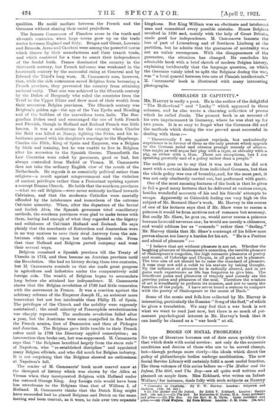COMRADES IN CAPTIVITY.* MR. HARVEY is really a poet. He
is the author of the delightful " The Hollowland " and " Lucky " which appeared in these columns, and he also wrote a charming collection of poems which he called Ducks. The present book is an account of his own imprisonment in Germany, where he was shut up for two years. It is so easy to forget what the Germans did and
the methods which during the war proved most successful in dealing with them :— " Theoretically I am against reprisals, but undoubtedly experience is in favour of them as the only protest which appeals to the German mind and obtains prompt remedy of abuses. One might as well argue fair play with a tiger, or chivalry with a pig, as either with a Hun. There are exceptions, but I am speaking generally and of a policy rather than a people."
The author goes on to say that it was not that he did not meet with a certain kindness from individual Germans, but that the whole policy was one of brutality, and, for the most part, it was not only obediently carried out, but performed with gusto.
One of the most amusing features of the book is that he gives in full a good many lectures that he delivered at various camps, besides wonderful accounts of his and his friends' attempts to escape. Apparently at Gfiteraloh feeling ran very high on the subject of Mr. Bernard Shaw's work. Mr. Harvey in the course
of one of his lectures says that if Mr. Shaw were to rescue a princess it would be from motives not of romance but economy. But really Mr. Shaw, he goes on, would never rescue a princess because hewould neversee one; he would see merely a calmness, and would address her as " comrade " rather than " darling."
Mr. Harvey thinks that Mr. Shaw's contempt of his fellow-men proves almost too heavy-a burden for his art. " He is a Puritan
and afraid of pleasure"
" I believe that art without pleasure is not art. Whether the laughing pleasure of Shakespeare's oomedies, the terrible pleasure of Shakespeare's tragedies, the high romantic pleasures of poetry and music, of Coleridge and Chopin, in all great art is pleasure. The true aim of art should be to raise -the standard of pleasure. A man may not add a cubit to his stature by taking thought. By the influence of pleasure he is radically altered, and in art gains such experiences as life has forgotten to give him. The beneficent pains and pleasures of tragedy and comedy are the growing pains and pleasures of the soul. Therefore the wisdom of art is steadfastly to perform its mission, and not to usurp the function of the pulpit. I have never heard a sermon to compare with the poetry of Shakespeare or the music of Bach."
Some of the music and folk-lore collected by Mr. Harvey is interesting, particularly the Russian " Song of the Serf," of which he gives a translation. We may feel that a war book is not what we want to read just now, but there is so much of per- manent psychological interest in Mr. Harvey's book that it can hardly be classed as a " war book " at all.


































 Previous page
Previous page